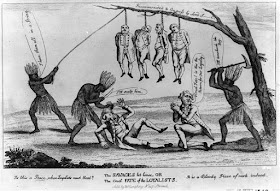Almost immediately, armed night watches roamed the streets of Albany, the county seat, in an attempt to intimidate those loyal to the King and British government. Organized “committees” disrupted meetings held in Albany’s town hall between the Tory leaning mayor and his aldermen. Local businessmen with questionable loyalties, including the prominent Richard Cartwright, were brutally assaulted and imprisoned. Tories who openly criticized or challenged the rebels’ motives were quickly arrested and sent off to prison. Newspapers and print shops advocating loyalty to the King were immediately suppressed and shut down.
Economic competition also motivated the actions of the Tory Committee. As the French and Indian War drew to a close, Scottish sutlers who followed and supplied the Highland regiments established their own businesses throughout Albany County. With a readily accessible customer base and network, many Scottish businessmen easily outpaced their “patriot” counterparts. With the rise in tensions between those loyal to Crown policy and those who were not, the Tory Committee seized upon an opportunity to crush their economic competitors. Merchants such as James and Alexander Robertson were all but helpless as mobs incited by the Tory Committee first shut down their print shop, then their newspaper, the Albany Gazette. Many other merchants were physically jailed merely for suspicion of being a Tory.
As the war progressed, many members of the patriot faction believed those loyal to the Crown were internal foes who needed to be carefully contained. In an effort to limit loyalist military and political influence, early in March of 1776, New York’s Committee of Safety perceived loyalist opposition to be so strong in certain counties, that they “advised that, in addition to disarming them [the Loyalists], their children should be taken as hostages.”
By the Fall of 1776, conditions in Albany County had deteriorated to the point that many Tories started to flee northward towards Canada so as to avoid continued persecution. Those who remained behind were subjected to increased scrutiny and repeated interrogation before committees charged with identifying and incarcerating those loyal to the King. On May 10, 1777, under intense questioning, a suspected Tory denied being a Tory so as to avoid incarceration. Unfortunately, his fate was sealed when refused to renounce his allegiance to the King. “One [man] protested he was no Tory, but was a man for the King”.
As William Bolts accurately predicted, “history abounds with instances of nations driven into madness by the cruelty of oppression; it is the singular situation of us at present that we have been made mad by an impatience of all legal restraint and wanton abuse of power.”

No comments:
Post a Comment